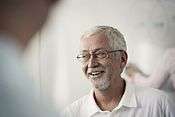Timothy J. Ley
Timothy J. Ley is an American hematologist and cancer biologist. He is the Lewis T. and Rosalind B. Apple Professor of Oncology in the Department of Medicine, is chief of the Section of Stem Cell Biology in the Division of Oncology and is Professor of Genetics at Washington University in St. Louis. He is an associate director of the McDonnell Genome Institute at Washington University and is affiliated with the Alvin J. Siteman Cancer Center.[1]
Timothy J. Ley, MD | |
|---|---|
 Timothy J. Ley | |
| Scientific career | |
| Institutions | McDonnell Genome Institute Washington University School of Medicine |
Dr. Ley's research group focuses on the genetics and genomics of acute myeloid leukemia (AML). His lab studies the development of normal and leukemic blood cells. His work is focused on identifying the mutations that are responsible for the initiation and progression of AML.[2]
Dr. Ley led the team that sequenced the first cancer genome (of an AML patient).[3] He has gone on to develop projects that will use whole genome sequencing to help diagnose and treat patients with leukemia.[4]
To better understand the role of many of the mutations discovered through whole genome sequencing of leukemias, he and his colleagues have constructed several mouse models of acute promyelocytic leukemia (APL), which are very similar to human APL.[5] Dr. Ley's laboratory has also extensively defined the roles of granzymes for the functions of cytotoxic and regulatory T cells.[6]
Dr. Ley grew up in Lakota, Iowa. He received his B.A. degree from Drake University in 1974, and his M.D. from Washington University School of Medicine in 1978. He did his internship and residency in Medicine at Massachusetts General Hospital, was a Clinical Associate at the NHLBI (National Heart, Lung, and Blood Institute), a Hematology-Oncology Fellow at Washington University Medical Center, and a Senior Investigator at the NHLBI before moving to Washington University in 1986.
In 2015, Ley was appointed to the National Cancer Advisory Board by President Obama.[7]
Awards and honors
- Elected fellow, National Academy of Sciences, 2019[8]
- Alfred G. Knudson Prize for Cancer Genetics, National Cancer Institute, 2015
- Recipient, The Erasmus Hematology Award, Erasmus MC, 2015
- Recipient, E. Donnall Thomas Prize, American Society of Hematology, 2012
- Recipient, The George Engelmann Interdisciplinary Award, Academy of Science, St. Louis, 2012
- Fellow, American Academy of Arts and Sciences, 2010
- Treasurer, Association of American Physicians, 2007–2012
- Member, National Academy of Medicine, 2003
- Fellow, American Association for the Advancement of Science, 2002
- President, American Society for Clinical Investigation, 1997–1998
References
- "Timothy Ley, MD". Retrieved 6 August 2012.
- "Cancer gene complexity revealed." "BBC News". 7 August 2009.
- "Experts Decode Cancer Patient's Genes, Seeking Treatment Clues." New York Times. 6 November 2008.
- "In Treatment for Leukemia, Glimpses of the Future." "New York Times". 7 July 2012.
- Siteman Cancer Center History
- Siteman Cancer Center Profile
- President Obama Announces More Key Administration Posts
- "2019 NAS Election". www.nasonline.org. Retrieved 30 April 2019.
External links
- McDonnell Institute Bio
- Divisions of Hematology & Oncology Bio
- Washington University Physicians Bio
- [Author] PubMed Citations
- "Healthy Living: The Code Breakers." St. Louis Magazine. June 2009.
- "Cancer gene complexity revealed." BBC News. 7 August 2009.